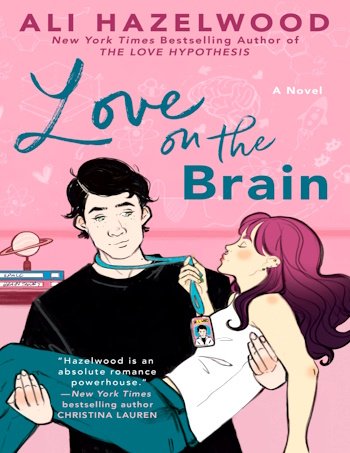“Poor baby.”
“You know what? It was a raccoon, but it had clearly died of old age.”
“What?”
“In that very spot. He died peacefully in his sleep, then someone ran him over. Nothing to be sad about.” I glare at him. At least I’m not crying anymore. “What were you saying about leveraging magnetothermal properties?”
“You’re full of shit.” I lift my legs, kick his forearm, and then lay my foot on the glove compartment. His eyes follow my every movement, linger briefly on my bare knees. “But thank you. For babysitting my feelings this
weekend. For not letting me free-fall into a pit of despair. I promise I’m going to revert to adult status. Starting now.” “Finally,” he deadpans.
I laugh. “For real—what did you tell Tim?”
“I said hi. Asked how he was.”
“Come on. You were speaking into his ear.”
“Just whispering sweet nothings.”
I snort. “Wouldn’t be surprising. You might be the only person in the lab he didn’t cheat on me with.” His long fingers grip the steering wheel and I instantly regret my words. “Hey, I was joking. I actually don’t care much anymore. Would I mind seeing Tim bent in two with a severe hemorrhoid attack? Nope. But neither would I go out of my way to stab him. Which I didn’t know before this weekend, and that’s . . . freeing.” Liberating, this almostindifference. It makes me much happier than the resentment I harbored for years. And the conversation with Annie . . . I haven’t processed it yet, but maybe this weekend was less of a waste than I thought. Except that I’m low-key panicking about my job again. “Whatever you told Tim . . .
thank you. It was nice to see him almost shit his pants.”
He shakes his head. “You shouldn’t thank me. It was selfish.”
“What did he do to you? Did he sneak bacon into your sandwich?
Because that’s totally his signature move—”
“No.” He presses his lips together, staring at the road.
“He lied to me.”
“Oh, yeah.” I nod knowingly. “His other signature move.”
The local NPR fills the silence. Something about Rachmaninoff. Until Levi says, “Bee, I . . . I’m not sure I should be telling you this. But hiding things from you hasn’t worked out in our favor. And you asked me to be honest.”
“I did.” I study him, unsure where he’s heading.
“When you and I first met,” he says slowly, carefully weighing his words,
“I had issues talking to people. About certain things.”
“Like . . . aphasia?”
He smiles, shaking his head. “Not quite.”
I try to think back to fifth-year Levi—he seemed larger than life, indomitable, whip-smart. Then again, Annie seemed invincible, and I apparently seemed effortless. Grad school really screwed us up, didn’t it? “I never noticed it. You were capable, self-assured, and got along with most people.” I mull it over. “Except for me, of course.”
“I’m not explaining myself well. I had no issues talking to normal people.
My issues were . . . with you.”
I scowl. “Are you saying that I’m not normal?”
He laughs silently. “You’re not normal. Not to me.”
“What does that mean?” I turn in the seat to face him, not sure why he’s insulting me again, after two days of being incredibly lovely. Is he having a relapse? “Just because you thought I was ugly or unlikable, it doesn’t mean that I wasn’t normal—”
“I never thought of you as ugly.” His hands tighten even more around the wheel. “Never.”
“Come on. The way you always acted was—”
“The opposite, in fact.”
I frown. “What do you even—” Oh.
Oh.
Oh.
Does he mean that—? No. Impossible. He wouldn’t.
Would he? Even if we . . . He can’t possibly be implying that. Can he?
“I—” My mind goes blank for a split second—complete, utter white-out void. I’m suddenly frozen numb, so I lean forward to turn off the AC. I have no clue how to answer him. How to stop my heart from beating out of my throat.
“Do you mean that you . . . ?” He nods.

























